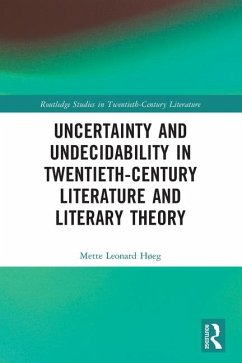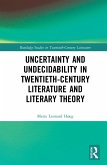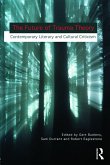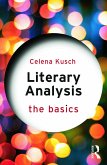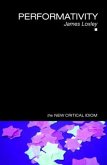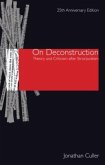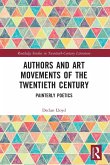Undecidability is a fundamental quality of literature and constitutive of what renders some works appealing and engaging across time and in different contexts. This book explores the essential literary notion and its role, function and effect in late nineteenth- and twentieth-century literature and literary theory. The book traces the notion historically, providing a map of central theories addressing interpretative challenges and recalcitrance in literature and showing 'theory of uncertainty' to be an essential strand of literary theory. While uncertainty is present in all literature, and indeed a prerequisite for any stabilisation of meaning, the Modernist period is characterised by a particularly strong awareness of uncertainty and its subforms of undecidability, ambiguity, indeterminacy, etc. With examples from seminal Modernist works by Woolf, Proust, Ford, Kafka and Musil, the book sheds light on undecidability as a central structuring principle and guiding philosophical idea in twentieth-century literature and demonstrates the analytical value of undecidability as a critical concept and reading-strategy. Defining undecidability as a specific 'sustained' and 'productive' kind of uncertainty and distinguishing it from related forms, such as ambiguity, indeterminacy and indistinction, the book develops a systematic but flexible theory of undecidability and outlines a productive reading-strategy based on the recognition of textual and interpretive undecidability.
Mette Leonard Høeg has done literary theory a great service in this wide-ranging, deeply researched, and highly perceptive study. She has a wonderfully clear-headed grasp of two phenomena - uncertainty and undecidability - that pervaded twentieth-century literature and criticism yet have never been analysed with such precision.
Christopher Norris, Emeritus Professor of Philosophy, Cardiff University
Mette Leonard Høeg's lucid study combines two important things: a valuable overview of a set of related concepts - uncertainty, ambiguity, indeterminacy, undecideability etc - showing just how constitutive they are across modern culture; and superb readings of exemplary texts by Musil, Ford, Woolf, Proust and Kafka.
Max Saunders, Interdisciplinary Professor of Modern Literature and Culture, University of Birmingham
In this rich, thoughtful and far-reaching study, Mette Leonard Høeg proposes that uncertainty is never merely a side-effect or peripheral concern of this or that theory of literature. Rather, as she deftly and compellingly demonstrates, there is no literary theory - or literature - without it.
Nicholas Royle, Professor of English, University of Sussex
Christopher Norris, Emeritus Professor of Philosophy, Cardiff University
Mette Leonard Høeg's lucid study combines two important things: a valuable overview of a set of related concepts - uncertainty, ambiguity, indeterminacy, undecideability etc - showing just how constitutive they are across modern culture; and superb readings of exemplary texts by Musil, Ford, Woolf, Proust and Kafka.
Max Saunders, Interdisciplinary Professor of Modern Literature and Culture, University of Birmingham
In this rich, thoughtful and far-reaching study, Mette Leonard Høeg proposes that uncertainty is never merely a side-effect or peripheral concern of this or that theory of literature. Rather, as she deftly and compellingly demonstrates, there is no literary theory - or literature - without it.
Nicholas Royle, Professor of English, University of Sussex

